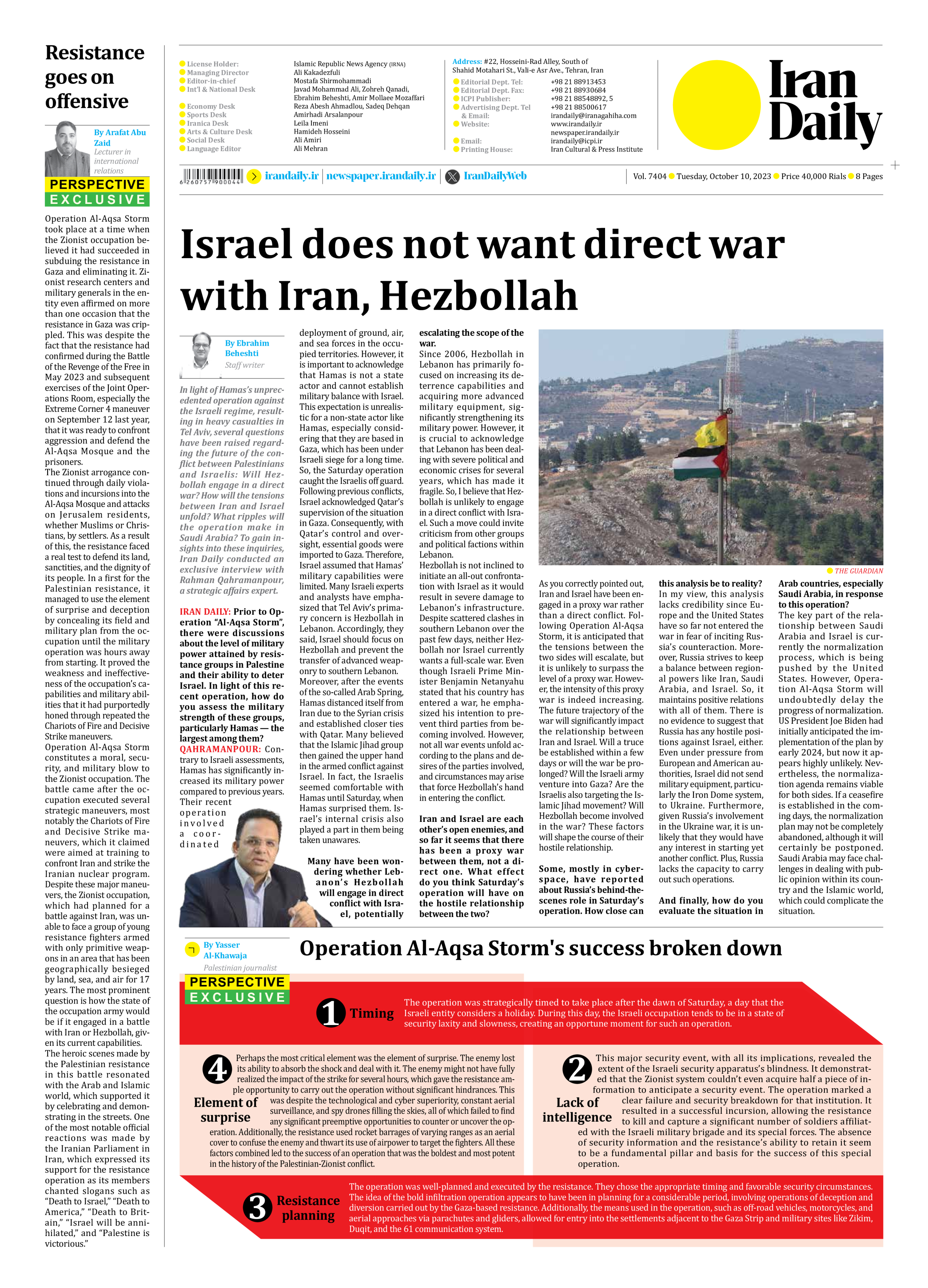
Israel does not want direct war with Iran, Hezbollah
By Ebrahim Beheshti
Staff writer
In light of Hamas’s unprecedented operation against the Israeli regime, resulting in heavy casualties in Tel Aviv, several questions have been raised regarding the future of the conflict between Palestinians and Israelis: Will Hezbollah engage in a direct war? How will the tensions between Iran and Israel unfold? What ripples will the operation make in Saudi Arabia? To gain insights into these inquiries, Iran Daily conducted an exclusive interview with Rahman Qahramanpour, a strategic affairs expert.
IRAN DAILY: Prior to Operation “Al-Aqsa Storm”, there were discussions about the level of military power attained by resistance groups in Palestine and their ability to deter Israel. In light of this recent operation, how do you assess the military strength of these groups, particularly Hamas — the largest among them?
QAHRAMANPOUR: Contrary to Israeli assessments, Hamas has significantly increased its military power compared to previous years. Their recent operation involved a coordinated
deployment of ground, air, and sea forces in the occupied territories. However, it is important to acknowledge that Hamas is not a state actor and cannot establish military balance with Israel. This expectation is unrealistic for a non-state actor like Hamas, especially considering that they are based in Gaza, which has been under Israeli siege for a long time. So, the Saturday operation caught the Israelis off guard.
Following previous conflicts, Israel acknowledged Qatar’s supervision of the situation in Gaza. Consequently, with Qatar’s control and oversight, essential goods were imported to Gaza. Therefore, Israel assumed that Hamas’ military capabilities were limited. Many Israeli experts and analysts have emphasized that Tel Aviv’s primary concern is Hezbollah in Lebanon. Accordingly, they said, Israel should focus on Hezbollah and prevent the transfer of advanced weaponry to southern Lebanon.
Moreover, after the events of the so-called Arab Spring, Hamas distanced itself from Iran due to the Syrian crisis and established closer ties with Qatar. Many believed that the Islamic Jihad group then gained the upper hand in the armed conflict against Israel. In fact, the Israelis seemed comfortable with Hamas until Saturday, when Hamas surprised them. Israel’s internal crisis also played a part in them being taken unawares.
Many have been wondering whether Lebanon’s Hezbollah will engage in direct conflict with Israel, potentially escalating the scope of the war.
Since 2006, Hezbollah in Lebanon has primarily focused on increasing its deterrence capabilities and acquiring more advanced military equipment, significantly strengthening its military power. However, it is crucial to acknowledge that Lebanon has been dealing with severe political and economic crises for several years, which has made it fragile. So, I believe that Hezbollah is unlikely to engage in a direct conflict with Israel. Such a move could invite criticism from other groups and political factions within Lebanon.
Hezbollah is not inclined to initiate an all-out confrontation with Israel as it would result in severe damage to Lebanon’s infrastructure. Despite scattered clashes in southern Lebanon over the past few days, neither Hezbollah nor Israel currently wants a full-scale war. Even though Israeli Prime Minister Benjamin Netanyahu stated that his country has entered a war, he emphasized his intention to prevent third parties from becoming involved. However, not all war events unfold according to the plans and desires of the parties involved, and circumstances may arise that force Hezbollah’s hand in entering the conflict.
Iran and Israel are each other’s open enemies, and so far it seems that there has been a proxy war
between them, not a direct one. What effect do you think Saturday’s
operation will have on the hostile relationship
between the two?
As you correctly pointed out, Iran and Israel have been engaged in a proxy war rather than a direct conflict. Following Operation Al-Aqsa Storm, it is anticipated that the tensions between the two sides will escalate, but it is unlikely to surpass the level of a proxy war. However, the intensity of this proxy war is indeed increasing. The future trajectory of the war will significantly impact the relationship between Iran and Israel. Will a truce be established within a few days or will the war be prolonged? Will the Israeli army venture into Gaza? Are the Israelis also targeting the Islamic Jihad movement? Will Hezbollah become involved in the war? These factors will shape the course of their hostile relationship.
Some, mostly in cyberspace, have reported about Russia’s behind-the-scenes role in Saturday’s operation. How close can this analysis be to reality?
In my view, this analysis lacks credibility since Europe and the United States have so far not entered the war in fear of inciting Russia’s counteraction. Moreover, Russia strives to keep a balance between regional powers like Iran, Saudi Arabia, and Israel. So, it maintains positive relations with all of them. There is no evidence to suggest that Russia has any hostile positions against Israel, either. Even under pressure from European and American authorities, Israel did not send military equipment, particularly the Iron Dome system, to Ukraine. Furthermore, given Russia’s involvement in the Ukraine war, it is unlikely that they would have any interest in starting yet another conflict. Plus, Russia lacks the capacity to carry out such operations.
And finally, how do you evaluate the situation in Arab countries, especially Saudi Arabia, in response to this operation?
The key part of the relationship between Saudi Arabia and Israel is currently the normalization process, which is being pushed by the United States. However, Operation Al-Aqsa Storm will undoubtedly delay the progress of normalization. US President Joe Biden had initially anticipated the implementation of the plan by early 2024, but now it appears highly unlikely. Nevertheless, the normalization agenda remains viable for both sides. If a ceasefire is established in the coming days, the normalization plan may not be completely abandoned, although it will certainly be postponed. Saudi Arabia may face challenges in dealing with public opinion within its country and the Islamic world, which could complicate the
situation.







